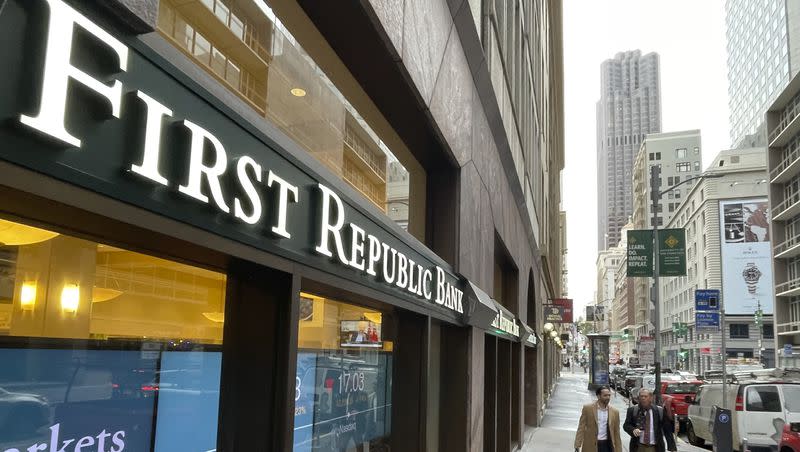Regulators seize First Republic in 3rd major U.S. bank failure in 2 months

- Oops!Something went wrong.Please try again later.
A turnaround plan announced just weeks ago, along with $30 billion in emergency funding from a consortium of banks, wasn’t enough to keep San Francisco-based First Republic Bank afloat as regulators seized the bank Monday morning.
The FDIC made a two-part announcement early Monday that included news that First Republic had entered into receivership after the California Department of Financial Protection and Innovation closed the bank. And FDIC officials said the independent agency had entered into a purchase agreement with JPMorgan Chase Bank “to assume all of the deposits and substantially all of the assets of First Republic Bank.”
The closure, the second-largest in U.S. banking history, marks the third midlevel bank failure in two months after Silicon Valley and Signature Banks were shuttered in mid-March after a confluence of challenging issues, including customer runs on deposits.
First Republic reportedly lost some $100 billion in depositor flight following the failure of Silicon Valley and Signature Bank. And, like those banks, First Republic had an unusually high percentage of depositors with balances in excess of the FDIC’s $250,000 insurance cap. The depositor excess fueled a precipitous decline in First Republic’s stock prices, which was down over 95% for the year on Friday.
The FDIC reports the failure will cost its Deposit Insurance Fund approximately $13 billion and also said it’s entering into a loss-share transaction on single-family, residential and commercial loans it purchased of the former First Republic Bank.
Related
Zions pushes back on Moody’s report as U.S. banking industry faces ongoing challenges
Utah leaders respond to Silicon Valley Bank meltdown as feds promise to cover depositors
But does First Republic’s failure mark an end to turmoil in the U.S. banking sector?
JPMorgan Chase CEO Jamie Dimon said that the deal resolves much of the fallout in the banking sector that has started since the sudden collapse of Silicon Valley Bank in March, per a report by CNBC.
“There are only so many banks that were offsides this way,” Dimon told shareholders in a call after the deal was announced. “There may be another smaller one, but this pretty much resolves them all; this part of the crisis is over.”
Dimon also said Monday that the deal eased the fiscal burden for the FDIC and would also turn out to be a net benefit for JPMorgan Chase investors.
“Our government invited us and others to step up, and we did,” Dimon said in a press release. “Our financial strength, capabilities and business model allowed us to develop a bid to execute the transaction in a way to minimize costs to the Deposit Insurance Fund.
“This acquisition modestly benefits our company overall, it is accretive to shareholders, it helps further advance our wealth strategy, and it is complementary to our existing franchise.”
JPMorgan Chase identified these key elements of the transaction:
Acquisition of the substantial majority of First Republic Bank’s assets, including approximately $173 billion of loans and approximately $30 billion of securities.
Assumption of approximately $92 billion of deposits, including $30 billion of large bank deposits, which will be repaid post-close or eliminated in consolidation.
The FDIC will provide loss share agreements covering acquired single-family residential mortgage loans and commercial loans, as well as $50 billion of five-year, fixed-rate term financing.
JPMorgan Chase is not assuming First Republic’s corporate debt or preferred stock.
JPMorgan Chase is the largest bank in the U.S., reporting some $3.7 trillion in assets under management as of the end of March. At midday on Monday, the bank’s stock was trading at $141.43 per share and had a market capitalization of over $414 billion.
The FDIC reports that on April 13, First Republic Bank had approximately $229.1 billion in total assets and $103.9 billion in total deposits. All 84 of First Republic’s offices in eight states will reopen as branches of JPMorgan Chase Bank Monday and customers will have full access to all of their deposits, according to the FDIC.

